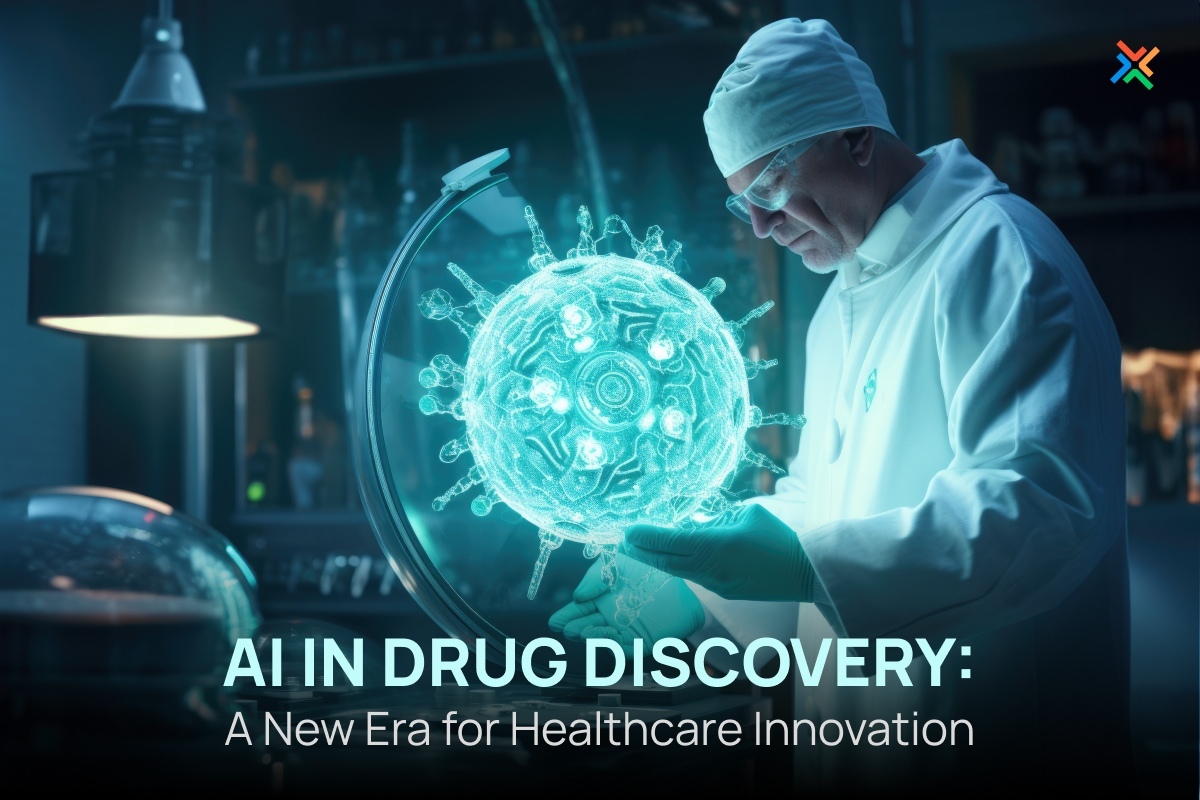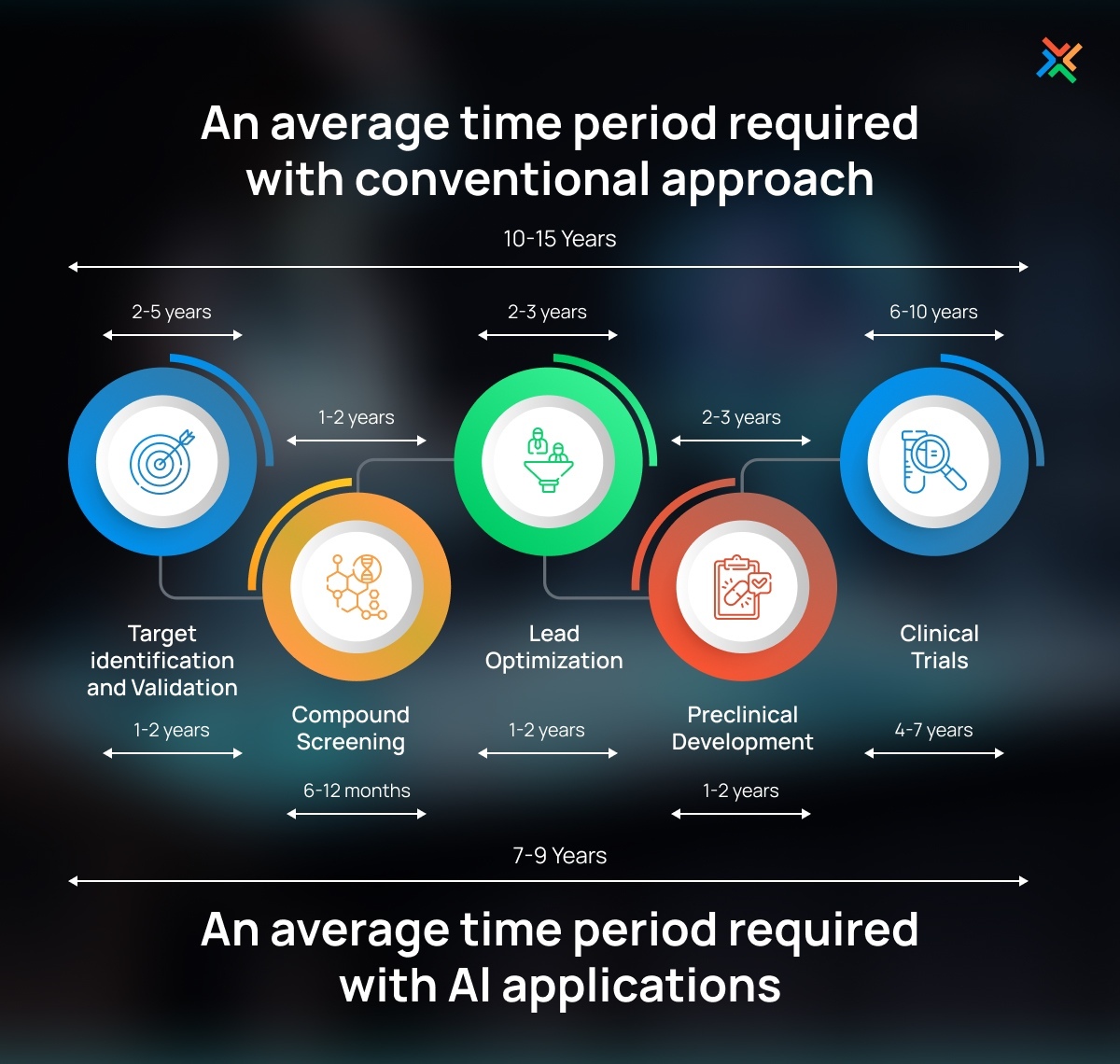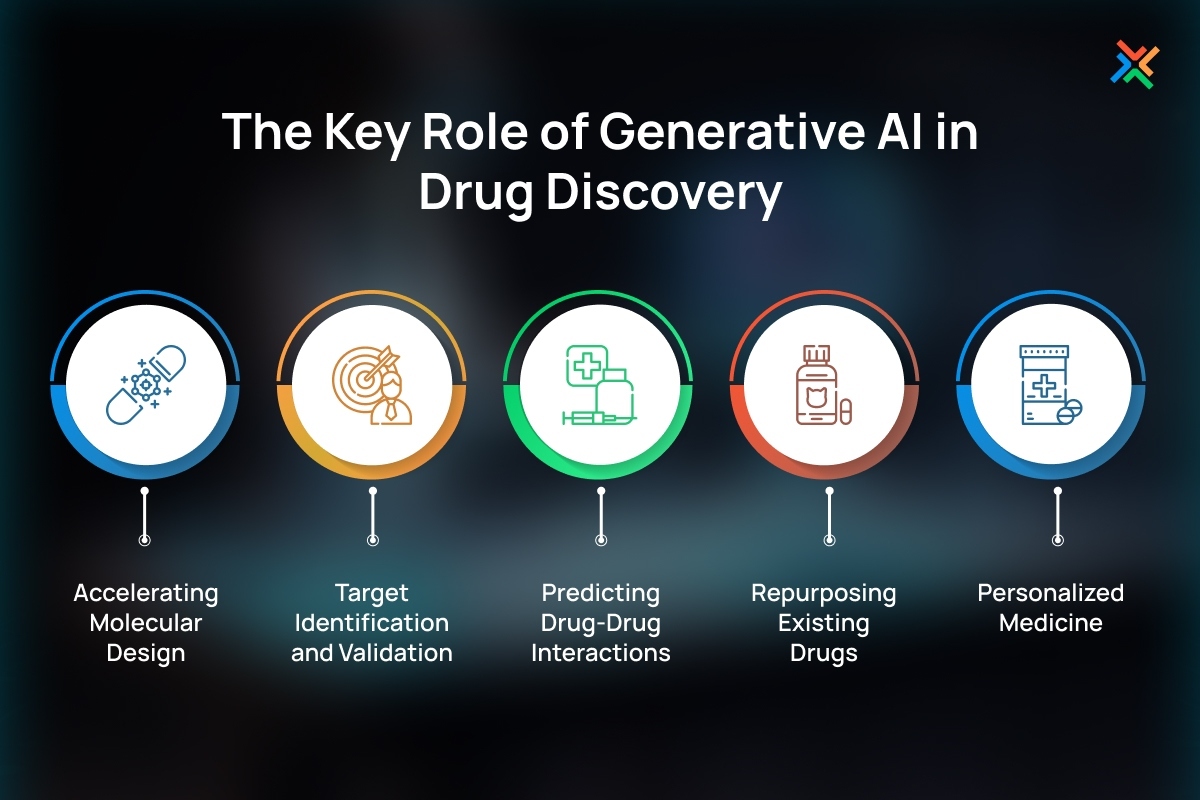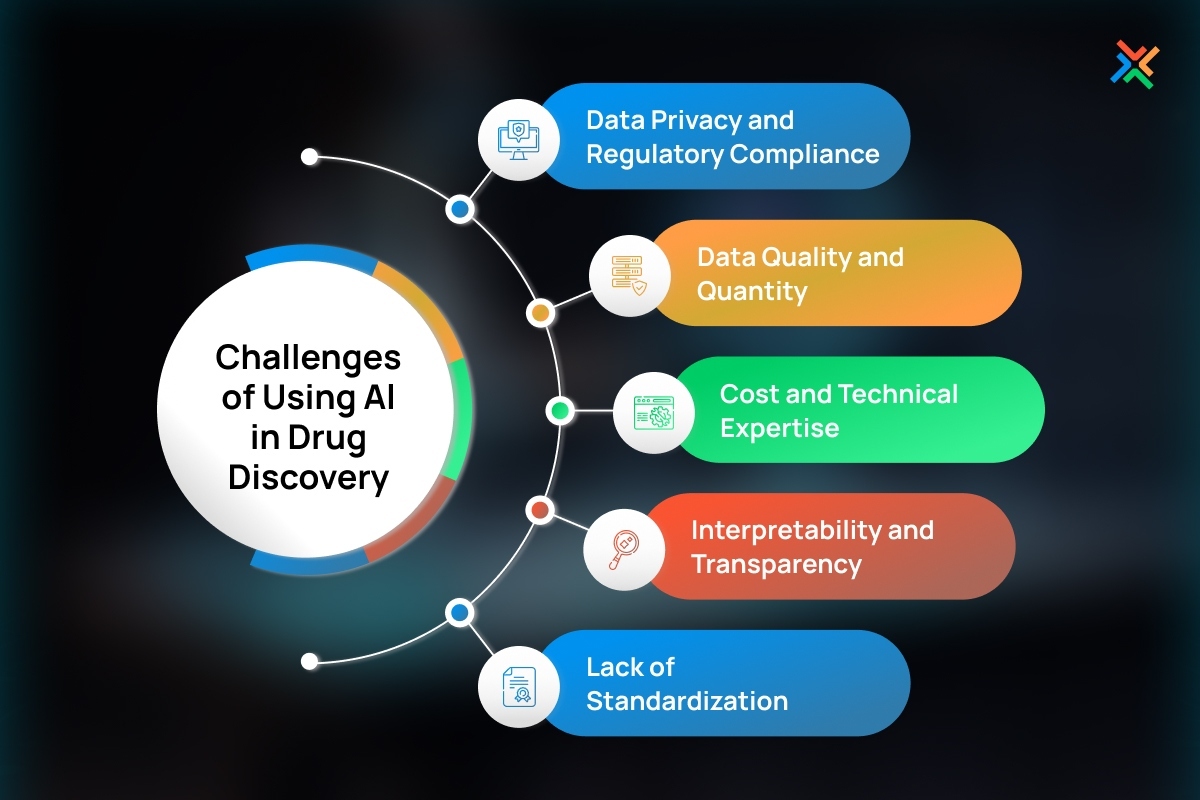Revolutionizing Healthcare with AI-Powered Drug Discovery: Accelerating Research and Development
June 25, 2024

Ayush Kanodia

The drug discovery and development process has long been plagued by numerous challenges. As per Deloitte Insights, on average, it can take 10-12 years to bring a single drug from initial discovery to market. The financial burden is equally staggering, with estimates suggesting costs can reach a staggering $2.5 billion as per the National Association of Manufacturers (NAM), U.S. Furthermore, the failure rate for drug candidates is staggeringly high, with only about 12% of drugs that enter clinical trials ultimately receiving FDA approval. These obstacles have left many critical medical needs unmet, particularly in areas like antibiotic resistance, where new treatment options are desperately needed.
Traditional drug discovery depends heavily on manual, time-consuming processes, such as screening large chemical libraries, conducting extensive preclinical studies, and navigating complex clinical trial phases. This approach has inherent limitations in terms of scalability, efficiency, and the ability to uncover truly innovative therapeutic solutions. However, the onset of artificial intelligence (AI) is set to reform the pharmaceutical industry, offering the potential to dramatically accelerate research and development (R&D) while also improving the success rate of new drug candidates.

AI development in Healthcare is already demonstrating its impact across every stage of the drug discovery pipeline, from target identification and lead optimization to preclinical testing and clinical trial design. By leveraging machine learning, deep learning, and other advanced AI techniques, researchers and pharmaceutical companies can now explore large chemical spaces, predict drug-target interactions, and simulate biological responses with unprecedented speed and accuracy. This AI-driven approach can lead to a more efficient, cost-effective, and successful drug discovery, ultimately resulting in better treatments and improved patient outcomes.
The Role of AI in Drug Discovery
So, how exactly are AI development services in the UAE transforming drug discovery from a slow and arduous process into a powerful engine for innovation?
Identifying Promising Drug Targets
Artificial Intelligence (AI) plays a crucial role in identifying promising drug targets by analyzing large datasets of genetic information, protein structures, and disease models. This involves using machine learning algorithms to identify patterns and correlations between different biological entities. For instance, researchers can use AI to analyze genomic data and identify genetic variations associated with specific diseases, which can then be targeted for therapeutic intervention. By combining this information with protein structures and disease models, AI can help identify potential drug targets and prioritize them for further investigation.
Virtual Screening
Virtual screening is another key AI application in drug discovery. This involves utilizing deep learning to simulate interactions between drug candidates and molecular targets, filtering out unsuitable options, and identifying the most promising compounds for further testing. AI algorithms can rapidly screen large chemical libraries, evaluating the binding affinity and pharmacokinetic properties of each compound. This process can significantly reduce the time and cost associated with traditional experimental methods, allowing researchers to identify potential drug candidates more efficiently.
De Novo Drug Design
De Novo drug design is an advanced technique that facilitates the generation of entirely new drug structures with desired properties. This involves using machine learning algorithms to predict the properties of novel compounds based on their chemical structure. By combining this information with knowledge of the target protein and disease mechanisms, AI can design novel compounds that are customized to specific therapeutic needs. For example, researchers have used AI to design novel antibiotics that target specific bacterial pathways, offering a potential solution to the growing problem of antibiotic resistance.
Natural Language Processing (NLP)
Natural Language Processing (NLP) is another AI technique that is gaining traction in drug discovery. NLP helps in the analysis of scientific literature and accelerates information discovery by automatically extracting relevant information from published studies. This can help researchers identify patterns and trends in the literature, identify potential drug targets, and stay up-to-date with the latest research findings. By utilizing NLP, researchers can optimize their workflow, reduce time spent on literature review, and focus on more high-value tasks.

The Impact of AI on R&D
One of the most notable impacts of AI is how it can drastically reduce the time it takes to bring a new drug to market. By automating tasks like target identification and virtual screening, AI can shave years off the traditional timeline. This leads to faster development of treatments for patients in desperate need.
Real-World Examples
Several companies are already reaping the benefits of AI in drug discovery. For example, Exscientia, a leading AI-powered drug discovery company, partnered with Roche to develop benzene inhibitors for targeting a specific protein involved in cancer progression. Harnessing AI’s ability to analyze vast datasets and predict drug-target interactions, Exscientia considerably accelerated the identification of promising drug candidates.
Another example comes from Insilico Medicine, which employed its AI platform to develop a potential treatment for idiopathic pulmonary fibrosis (IPF), a chronic lung disease. Their AI identified a novel drug target and predicted how a specific molecule could interact with it. This crucial information helped researchers fast-track the development of a potential new therapy for IPF patients.
Clinical Trials & Optimization
AI has also revolutionized clinical trial design and optimization. By analyzing electronic medical records and patient data, AI can identify suitable candidates for clinical trials, optimize trial designs, and predict patient outcomes. This allows researchers to optimize patient recruitment, reduce trial costs, and improve treatment efficacy.
Patient Selection & Dose Optimization
AI-driven clinical trials can also optimize patient selection and dose optimization. By analyzing patient data and predicting treatment responses, AI can identify the most suitable patients for specific treatments and optimize dosing regimens. This makes sure that patients receive the most effective treatment at the right dose, reducing the risk of adverse reactions and improving overall treatment outcomes.
Exploring New Possibilities with AI
Novel Drug Targets and Mechanisms of Action
Artificial intelligence (AI) can facilitate the discovery of novel drug targets and mechanisms of action, leading to entirely new treatment approaches. By analyzing huge amounts of genomic and proteomic data, AI can identify previously unknown biological pathways and mechanisms that are associated with specific diseases. This information can then be used to design novel compounds that target these pathways, leading to the development of new treatments that are more effective and less toxic.
Personalized Medicine
AI also holds significant promise for personalized medicine, as it can assist in the personalizing of drugs to individual patient needs. By analyzing a patient's unique genomic profile, medical history, and treatment response, AI can predict which treatments are most likely to be effective and which may cause adverse reactions. This personalized approach can lead to more effective treatments, reduced side effects, and improved patient outcomes.
Challenges and Considerations
There are several challenges and considerations that must be addressed to ensure the successful application of AI in drug discovery. One of the primary challenges is data bias, which can occur when AI models are trained on datasets that are not representative of the broader population. This can lead to inaccurate predictions and unfair outcomes. Furthermore, the interpretability of AI results is a major concern, as it can be difficult to understand how AI models arrive at their conclusions. This lack of transparency can make it challenging to identify and address potential biases in the data and models.
Human Expertise and Collaboration
Despite these challenges, human expertise remains essential for optimal outcomes in AI-powered drug discovery. Human researchers must work in collaboration with AI systems to make sure that the data used to train AI models is accurate and representative. They must also validate the results generated by AI models so that they are reliable and actionable. This collaboration is critical for addressing the limitations of AI and getting results that are both accurate and ethical.
Ethical Considerations
Ethical considerations are another major concern in AI-powered drug discovery. Data privacy is a major issue, as the use of patient data for AI training can raise concerns about confidentiality and security. Furthermore, there are concerns about fair access to medications, as AI-powered drug discovery may lead to the development of treatments that are not accessible to all populations. These ethical considerations must be carefully addressed to guarantee that AI-enabled drug discovery is both effective and equitable.

AI Promises a Brighter Future for Healthcare
With the rapid growth of data and computing power, AI models are becoming increasingly sophisticated, facilitating the discovery of novel drug targets and mechanisms of action. Plus, the integration of AI with other technologies, such as genomics and precision medicine, will further accelerate the development of personalized treatments. New techniques will make it easier to understand the rationale behind AI's recommendations, promoting greater trust and transparency in the drug development process.
The impact of AI-powered drug discovery on human health and well-being is undisputed. By accelerating the development of new treatments and improving treatment outcomes, AI can save countless lives and improve the quality of life for millions of people worldwide. As we move forward, it is essential that we continue to prioritize the development of AI-powered drug discovery, making sure that this technology is used to benefit humanity.
To learn more about WDCS Technology’s – a reputable AI development company in the UAE - comprehensive AI solutions and how they are transforming the pharmaceutical industry, feel free to reach out to us at wdsctechnology.ae.
Give your healthcare business the AI boost and stay ahead of the curve.
AI is transforming various industries, including healthcare. At WDCS, we offer a comprehensive suite of AI solutions to help infuse innovation into your healthcare venture.